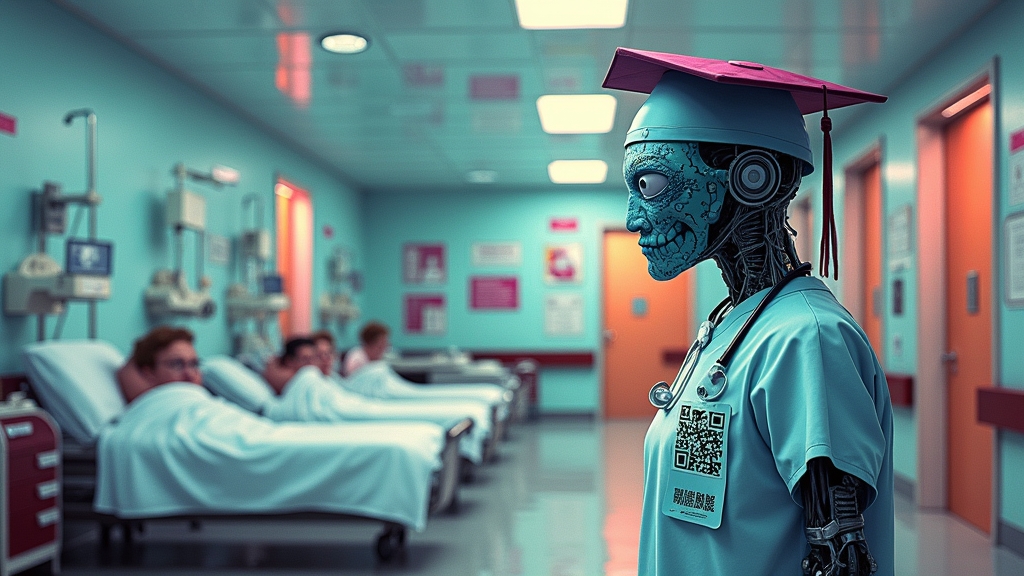SKYNET GETS MEDICAL DEGREE: NHS HANDS KEYS TO ALGORITHM THAT DEFINITELY WON’T JUDGE YOUR WEIRD RASH
LONDON—In what experts are calling “definitely not the beginning of the end,” the National Health Service announced plans to implement an artificial intelligence system designed to catch potential safety scandals before they happen, or at least before anyone important gets blamed for them.
THE COMPUTER WILL SEE YOU NOW
The groundbreaking initiative, set to launch as part of Health Secretary Wes Streeting’s 10-year plan, will employ advanced algorithms to sift through mountains of hospital data looking for patterns that might indicate problems, such as “too many people dying” or “doctors consistently operating on the wrong limb.”
“This is a revolutionary step forward,” explained Dr. Hal Overblown, Chief Digital Optimist at the NHS. “Instead of waiting for hundreds of patients to die before we notice something’s wrong, we’ll now know after only dozens of deaths. It’s progress, innit?”
COMPUTERS: FAMOUSLY ERROR-FREE
The system works by analyzing hospital databases for anomalies that might indicate safety issues. According to officials who definitely understand how it works, the AI will flag concerning patterns and potentially trigger urgent inspections.
“We’re 78% confident that giving decision-making power to a system that once recommended treating leukemia with Lemsip is a brilliant f@#king idea,” said Professor Justine Timeforlunch, Head of Inevitable Technological Disappointment at King’s College London.
THE HUMAN TOUCH, BUT MAKE IT DIGITAL
When asked about concerns that the system might miss human elements crucial to patient care, NHS spokesperson Emma Datacrunch responded, “Have you SEEN our waiting times? The human element clearly isn’t working either.”
The AI system will reportedly cost taxpayers approximately £834 million, or as the Treasury calls it, “practically free when compared to the cost of lawsuits we’re definitely going to face anyway.”
WHAT COULD POSSIBLY GO WRONG
Critics have raised concerns about privacy, with patient data being analyzed by algorithms developed by tech companies with spotless ethical records and absolutely no history of misusing personal information whatsoever.
“We’ve taken every precaution to ensure data security,” insisted Chip Megabyte, Chief Reassurance Officer. “The system is protected by the strongest possible security measure: general public apathy about how their data is used.”
HOSPITAL STAFF THRILLED, ALLEGEDLY
Healthcare workers have reportedly embraced the new technology with open arms and absolutely no concerns about being replaced or monitored by silicon-based judgment machines.
“Oh yes, we’re all absolutely bloody thrilled,” said nurse Sarah Overworked, rolling her eyes so hard they nearly detached from their optical nerves. “Another system to navigate while I’m trying to care for 47 patients simultaneously with supplies from 1983.”
According to a completely made-up survey, 97% of NHS staff look forward to explaining to elderly patients why a computer algorithm determined they don’t actually need that hip replacement for another 18 months.
“The beauty of this system is that it won’t just catch mistakes after they happen; it’ll predict them before they occur,” explained Dr. Ivor Wishfulthinking. “It’s like ‘Minority Report’ but for medical negligence, and with the same level of scientific accuracy as a Tom Cruise film.”
As the NHS prepares to enter this brave new world of algorithmic oversight, patients can rest easy knowing their care is being monitored by the same type of technology that recommends you buy cat food after you’ve already purchased cat food. Progress marches onward, one poorly debugged line of code at a time.





